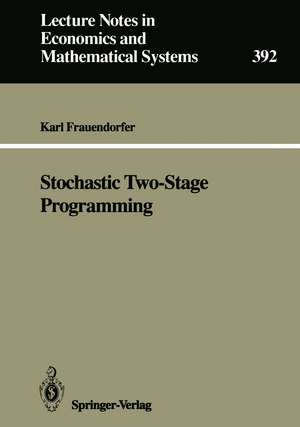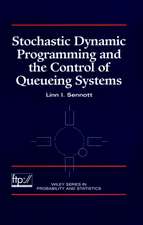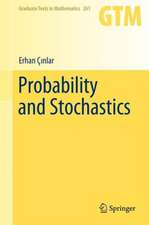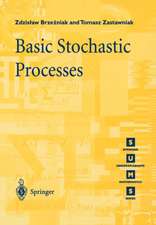Stochastic Two-Stage Programming: Lecture Notes in Economics and Mathematical Systems, cartea 392
Autor Karl Frauendorferen Limba Engleză Paperback – 17 dec 1992
Din seria Lecture Notes in Economics and Mathematical Systems
-
 Preț: 360.02 lei
Preț: 360.02 lei -
 Preț: 383.93 lei
Preț: 383.93 lei -
 Preț: 384.09 lei
Preț: 384.09 lei -
 Preț: 380.07 lei
Preț: 380.07 lei -
 Preț: 446.26 lei
Preț: 446.26 lei -
 Preț: 497.37 lei
Preț: 497.37 lei -
 Preț: 380.84 lei
Preț: 380.84 lei -
 Preț: 384.86 lei
Preț: 384.86 lei -
 Preț: 378.34 lei
Preț: 378.34 lei -
 Preț: 399.67 lei
Preț: 399.67 lei - 20%
 Preț: 360.93 lei
Preț: 360.93 lei - 15%
 Preț: 643.16 lei
Preț: 643.16 lei -
 Preț: 379.09 lei
Preț: 379.09 lei -
 Preț: 404.74 lei
Preț: 404.74 lei -
 Preț: 385.62 lei
Preț: 385.62 lei - 15%
 Preț: 644.49 lei
Preț: 644.49 lei -
 Preț: 379.09 lei
Preț: 379.09 lei -
 Preț: 345.50 lei
Preț: 345.50 lei -
 Preț: 425.80 lei
Preț: 425.80 lei -
 Preț: 378.34 lei
Preț: 378.34 lei - 18%
 Preț: 775.65 lei
Preț: 775.65 lei -
 Preț: 392.60 lei
Preț: 392.60 lei -
 Preț: 401.61 lei
Preț: 401.61 lei - 15%
 Preț: 646.43 lei
Preț: 646.43 lei -
 Preț: 382.18 lei
Preț: 382.18 lei -
 Preț: 378.34 lei
Preț: 378.34 lei - 15%
 Preț: 637.59 lei
Preț: 637.59 lei - 15%
 Preț: 647.27 lei
Preț: 647.27 lei -
 Preț: 377.73 lei
Preț: 377.73 lei -
 Preț: 447.84 lei
Preț: 447.84 lei - 15%
 Preț: 644.49 lei
Preț: 644.49 lei -
 Preț: 386.00 lei
Preț: 386.00 lei - 15%
 Preț: 654.43 lei
Preț: 654.43 lei -
 Preț: 415.02 lei
Preț: 415.02 lei -
 Preț: 411.54 lei
Preț: 411.54 lei -
 Preț: 398.92 lei
Preț: 398.92 lei -
 Preț: 398.92 lei
Preț: 398.92 lei -
 Preț: 392.75 lei
Preț: 392.75 lei - 15%
 Preț: 635.47 lei
Preț: 635.47 lei - 20%
 Preț: 653.56 lei
Preț: 653.56 lei -
 Preț: 379.86 lei
Preț: 379.86 lei -
 Preț: 495.46 lei
Preț: 495.46 lei -
 Preț: 447.99 lei
Preț: 447.99 lei -
 Preț: 378.71 lei
Preț: 378.71 lei - 15%
 Preț: 637.13 lei
Preț: 637.13 lei -
 Preț: 385.84 lei
Preț: 385.84 lei -
 Preț: 378.54 lei
Preț: 378.54 lei - 15%
 Preț: 666.55 lei
Preț: 666.55 lei -
 Preț: 380.07 lei
Preț: 380.07 lei
Preț: 387.38 lei
Nou
Puncte Express: 581
Preț estimativ în valută:
74.12€ • 77.60$ • 61.33£
74.12€ • 77.60$ • 61.33£
Carte tipărită la comandă
Livrare economică 05-19 aprilie
Preluare comenzi: 021 569.72.76
Specificații
ISBN-13: 9783540560975
ISBN-10: 3540560971
Pagini: 244
Ilustrații: VIII, 228 p.
Dimensiuni: 170 x 242 x 13 mm
Greutate: 0.4 kg
Ediția:Softcover reprint of the original 1st ed. 1992
Editura: Springer Berlin, Heidelberg
Colecția Springer
Seria Lecture Notes in Economics and Mathematical Systems
Locul publicării:Berlin, Heidelberg, Germany
ISBN-10: 3540560971
Pagini: 244
Ilustrații: VIII, 228 p.
Dimensiuni: 170 x 242 x 13 mm
Greutate: 0.4 kg
Ediția:Softcover reprint of the original 1st ed. 1992
Editura: Springer Berlin, Heidelberg
Colecția Springer
Seria Lecture Notes in Economics and Mathematical Systems
Locul publicării:Berlin, Heidelberg, Germany
Public țintă
ResearchCuprins
0 Preliminaries.- I Stochastic Two-Stage Problems.- 1 Convex Case.- 2 Nonconvex Case.- 3 Stability.- 4 Epi-Convergence.- 5 Saddle Property.- 6 Stochastic Independence.- 7 Special Convex Cases.- II Duality and Stability in Convex Optimization (Extended Results for the Saddle Case).- 8 Characterization and Properties of Saddle Functions.- 9 Primal and Dual Collections of Programs.- 10 Normal and Stable Programs.- 11 Relation to McLinden’s Results.- 12 Application to Convex Programming.- III Barycentric Approximation.- 13 Inequalities and Extremal Probability Measures — Convex Case.- 14 Inequalities and Extremal Probability Measures — Saddle Case.- 15 Examples and Geometric Interpretation.- 16 Iterated Approximation and x-Simplicial Refinement.- 17 Application to Stochastic Two-Stage Programs.- 18 Convergence of Approximations.- 19 Refinement Strategy.- 20 Iterative Completion.- IV An Illustrative Survey of Existing Approaches in Stochastic Two-Stage Programming.- 21 Error Bounds for Stochastic Programs with Recourse (due to Kali & Stoyan).- 22 Approximation Schemes discussed by Birge & Wets.- 23 Sublinear Bounding Technique (due to Birge & Wets).- 24 Stochastic Quasigradient Techniques (due to Ermoliev).- 25 Semi-Stochastic Approximation (due to Marti).- 26 Benders’ Decomposition with Importance Sampling (due to Dantzig & Glynn).- 27 Stochastic Decomposition (due to Higle & Sen).- 28 Mathematical Programming Techniques.- 29 Scenarios and Policy Aggregation (due to Rockafellar & Wets).- V BRAIN — BaRycentric Approximation for Integrands (Implementation Issues).- 30 Storing Distributions given through a Finite Set of Parameters.- 31 Evaluation of Initial Extremal Marginal Distributions.- 32 Evaluation of Initial Outer and Inner Approximation.- 33 Data forx-Simplicial Partition.- 34 Evaluation of Extremal Distributions — Iteration!.- 35 Evaluation of Outer and Inner Approximation — Iteration J.- 36 x-Simplicial Refinement.- VI Solving Stochastic Linear Two-Stage Problems (Numerical Results and Computational Experiences).- 37 Testproblems from Literature.- 38 Randomly Generated Testproblems.












